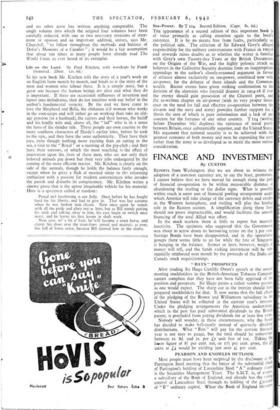Life on the Land. By Fred Kitchen, with woodcuts by
Frank Ormerod. (Dent. 12S. 6d.) IN his new boolg Mr. Kitchen tells the story of a year's work on an English farm month by month, and binds to it the story of the men and women who labour there. It is a simple story, but a great one because the human beings are alive and what they do is important. If there are occasional stiffnesses of invention and lapses into melodrama, they do not interfere with our belief in the author's fundamental veracity. By the end we have come to love the Shepherd and Bella, the obdurate old woman who works in the root-crops and will rather go on working than take an old- age pension (or a husband), the carters and their horses, the bailiff and his kindly wife and, above all, the " lad"' who is in a sense the hero of the slender tale. These people are own cousins to the more southern characters of Hardy's earlier' tales, before he took to the epic, and they have the same authenticity. They have their joys, even though nothing more exciting than an outing to the sea, a visit to the " Royal " or a meeting of the pig-club ; and they have their sorrows, of which the most touching is the effect of innovation upon the. lives of these men, who see not only their beloved animals put down but their very jobs endangered by the coming of the more efficient tractor. Mr. Kitchen is clearly on the side of the animals, though he holds the _balance fairly enough, except when he gives a flick of merited satire to the reforming enthusiast with a passion for modern conveniences who invades the parish and disturbs its complacency. Mr. Kitchen writes a sinewy prose that is the aptest imaginable vehicle for his material. Here is a specimen culled at random: Proud and headstrong is our Jolly. Once before he has fought hard for his liberty, and had to give in. That was last autumn when he was broken into chains. Now once again he stands with all the pride and glory out oA him; but as Bill stands patting his neck and talking away to him, his ears begin to twitch once more, and he learns his first lesson in shaft work.
Next year, wi' a bit o' luck, he-will become a town horse, and clatter his shoes over the tram-lines• proud and majestic as ever, but full of horse sense, because Bill tutored him in the shafts.


























 Previous page
Previous page